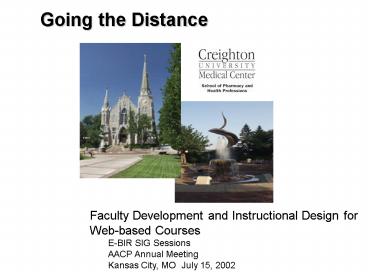Going the Distance - PowerPoint PPT Presentation
1 / 30
Title:
Going the Distance
Description:
Faculty Development and Instructional Design for Web-based Courses. E-BIR SIG Sessions ... instructional design guidelines for course web sites and web pages ... – PowerPoint PPT presentation
Number of Views:32
Avg rating:3.0/5.0
Title: Going the Distance
1
Going the Distance
Faculty Development and Instructional Design for
Web-based Courses E-BIR SIG Sessions AACP Annual
Meeting Kansas City, MO July 15, 2002
2
Presenter
- Tracy Chapman, M.Ed.
- Director
- Office of Information Technology and Learning
Resources - School of Pharmacy and Health Professions
- Creighton University Medical Center, Omaha, NE
3
Objectives
- Identify major pedagogical topics to be
considered in preparing faculty to teach in the
online environment - Summarize the course development process for
moving courses to the online environment - Summarize major instructional design guidelines
for course web sites and web pages - Summarize major faculty support issues to be
considered as courses are moved to the online
environment
4
If youre headed in the wrong direction,
technology wont get you to the right place.
- Ehrmann, 2002
5
Information Provider
Where are you now and where do you want to be?
Course Provider
- Level 1 Course Marketing/Syllabi via the Web
- Level 2 Web Resources for Student Exploration
- Level 3 Publish Student Generated Materials
- Level 4 Course Resources on the Web
- Level 5 Repurpose Web Resources for Others
- Level 6 Web Component is Substantive and Graded
- Level 7 Graded Activities Extend Beyond Class
- Level 8 Entire Web Course for Resident Students
- Level 9 Entire Web Course for Offsite Students
- Level 10 Course within Programmatic Initiative
Bonk, 2001
6
Major Topics of Faculty Development
- Prerequisites
- Development Teams
- CMS
- Quality
- Netiquette
- Knowing Your Students
- Instructors Role
- Interactivity
- Spinning Your Web
7
Prerequisites
- Basic computing technology skills
- Internet connection
- HTML creation software
- Hardware meets minimum specifications
8
Course Teams You are not alone
- What are course development teams
- Team members and their functions
- What if you do not have a team??????
9
Course Management Systems
- What are they?
- What is available at your institution?
- Do I have to use a CMS?
- Should I use a CMS?
10
Quality in the Online Environment
- 7 Principles for Good Practice applied to the
online environment - Design basics
- Elements of instruction
- Web design
- Course review process
11
Netiquette
- What is it?
- Top 10 guidelines
12
Knowing Your Students
- Characteristics of Successful Learners(Whitis,
2001) - Most are busy and need support to succeed
- Confident, motivated
- Assume responsibility for own learning
- Creative and risk takers
- Work well alone and together
- Good communicators
13
Knowing Your Students
- Characteristics of Successful Online Students
- Ability to realistically evaluate personal and
professional schedule/determine if time allows - Strong written communication skills
- Proactive in solving problems as arise
- Online education way to further education, not
easier - Belief high quality learning can take place
without going to a classroom
14
So Youre Going to Teach Online
- Characteristics of Successful Teachers (Whitis,
2001) - Lifelong learner
- Experienced teacher with a collaborative style of
teaching - Enjoys up front conceptual work
- Skilled at group process
- Explicit expectations
- Provides detailed and frequent feedback
15
So Youre Going to Teach Online
- What is the instructors role in the online
educational environment - Pedagogical
- Social
- Technological
- Managerial
16
Building in Interactivity
- Being visible
- Feedback
- Engaging reluctant students
- Discussion, chat, whiteboard
17
Spinning Your Web
- The 4 steps to course development
- Timeline
- ADA compliance
18
Course Development Process
- A Four Step Approach
19
Initial Meeting
- Meet the team members
- Overview of course development process
- Assessment of current hardware/software
- Assessment of instructors IT, and online
pedagogical skills - Begin preparation of syllabus, schedule,
introduction, and web site structure
20
Initial Meeting (cont.)
- Identify goals
- Instructional analysis
- Analysis of learners
- Write objectives
- Plan assessment instruments
21
Development of the Course
- Develop instructional strategy
- Develop and select instructional materials
- Instructor creates content, and activities
- Designers put content online
- Frequent meetings to evaluate course web site
development
22
Course Review
- Formative review of course web site
- Revisions
- Creation of online evaluation materials
23
Piloting the Course
- Student group for feedback
- Tweaking as a result of student feedback
- Discuss course management strategies
- Tutorials
- HTML software use for editing
- Use of communication tools
24
Revisions
- During semester course is taught - formative
assessment - Revisions
- Summative assessment as end of semester
- Revisions
25
Faculty Support Issues
- Technical, Pedagogical, Moral
26
Faculty Support Issues
- Technical
- JITT model works
- At faculty work location
- Easy access to assistance
27
Faculty Support Issues
- Pedagogical
- ½ to full day seminars
- Away from faculty work location
- Opportunities to connect with other faculty
- Easy access to assistance
28
Faculty Support Issues
- Moral
- Peers
- Administrative
- Rank tenure process
- Rewards
- Time
- Clerical
29
References
- Graham,C., Cagiltay,K., Lim,B., Craner,J., and
Duffy,T.M., (2001), Seven Principles of Effective
Teaching A Practical Lens for Evaluating Online
Courses, Technology Source, March/April 2002,
Retrieved June 2, 2002 from http//ts.mivu.org/def
ault.asp?showarticleid839 - Shea, V. Netiquette. San Francisco Albion Books.
1994 - Stamm,R., Howlett, B., (2002),Effective Course
Content by Design, Technology Source,
January/February 2002, Retrieved June 2, 2002
from http//ts.mivu.org/default.asp?showarticlei
d937actionprint
30
Thank you..
tchapman_at_creighton.edu http//spahp.creighton.edu/
chapman































